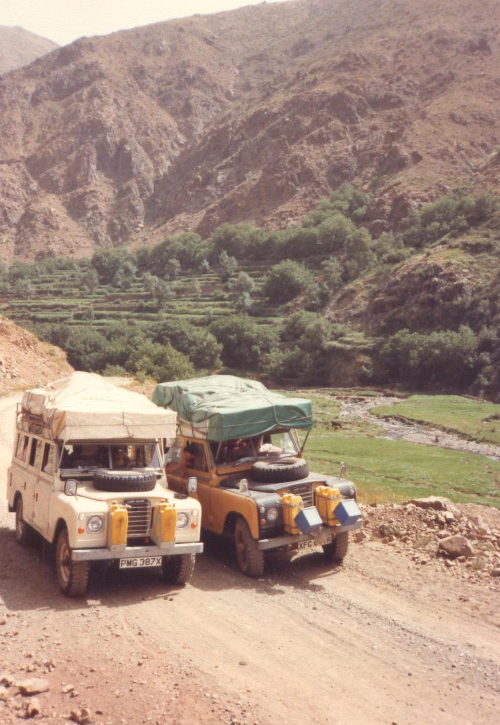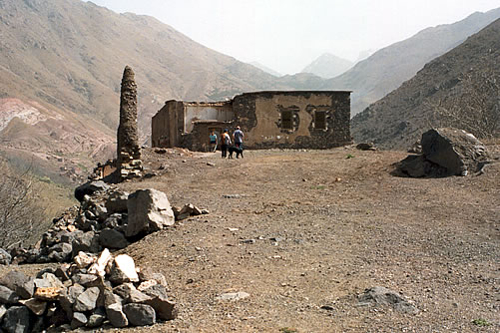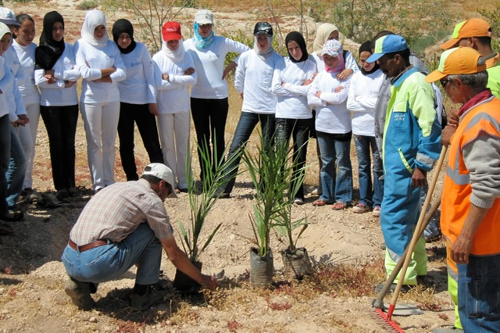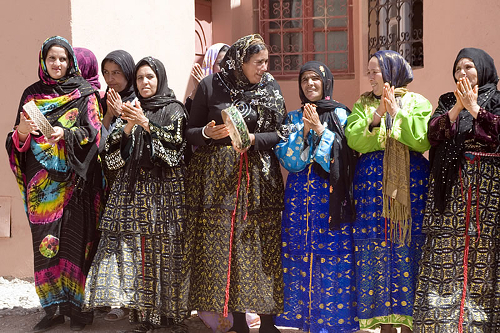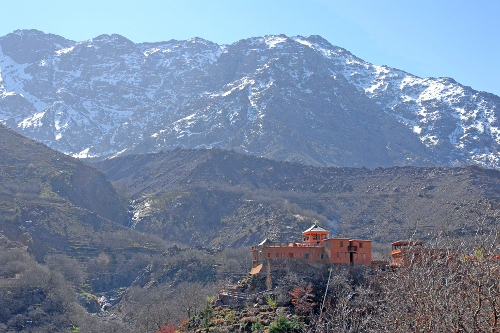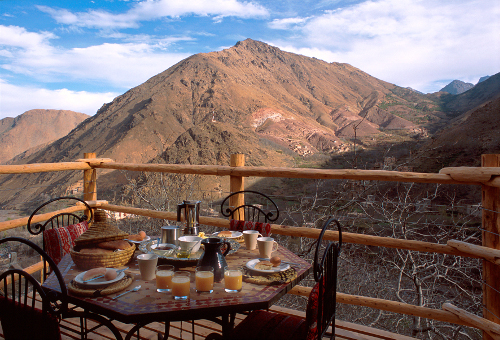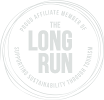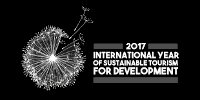Chris & Mike McHugo are Earth Changers.
From separate established careers in different parts of the world, Chris and Mike took their mother to visit a country they both loved, to stay with a local friend community leader in a remote valley headed up by a former baron's ruined palace. They didn't know they would end up buying and renovating the Kasbah du Toubkal, Morocco but it seemed a good opportunity to do the right thing. Here's their story:
Places
Chris: I studied a degree in Management Sciences and went on to work as an IT Project Manager for Arthur Anderson, which became Anderson Consulting, and more latterly Accenture. This meant me working and living all over the world, including Turkey and Istanbul for 6 months on a couple of occasions. I visited Morocco for the first time in 1969, and later took 6 weeks unpaid leave to visit my brother Mike there, a country and people we both loved.
Mike: I fell in love with the country in 1972 when I’d craved adventure and driven there in a second hand Beetle. I set up a company called Hobo Travel, filled a couple of Land Rovers with UK travellers by advertising in Private Eye magazine, and drove them around Morocco on a regular basis.
In 1978 I found myself in Imlil valley looking for trekking routes. It was extremely basic with no road, and no electricity for another 20 years; a trail-head village to Jbel Toubkal peak overseen by the Kasbah, originally the summer home palace of a local caïd (baron), left to rack and ruin when Morocco gained independence from France in 1956.
Chris: “In 1986, Mike’s Hobo Travel became Discover Ltd when myself and other family and friends joined the business to buy what was to become The Eagle’s Nest study centre in the Cevennes National Park in France, a fieldwork base operating educational tours for students, where Mike became an educator.
People
In 1989, our father died and Mike and I took our mother to Imlil, as guests of local mountain guide and respected community leader, Omar Ait Barmed (later known as Hajj Maurice after pilgrimage to Mecca), with whom Mike worked and had become firm friends. Looming over the village was the Kasbah's ruins.
I had seen in the Financial Times that the king, Hassan II, had decided to make investment in Morocco easier, especially in tourism. We knew someone would buy the Kasbah, and might turn it into an incongruent hotel, so we thought we should try – especially with our French business and Morocco community interests, we were safe hands.
Before the Kasbah opened, there really wasn’t much work in the villages, just some small scale seasonal trekking tourism. Men would have a winter exodus to go to the desert, to Marrakech, Agadir, Casablanca or further afield to find work, leaving families out of necessity for income.
Now, with the Kasbah employing local people on fair local wages, people can stay with their families – a vital ingredient for a connected community and where they prefer to be.
And it’s not just the Kasbah employing the people now, it’s also the guides, the muleteers and the shops that the Kasbah and the visitors buy from – it’s all money for the villages and for the Village Association to support the community further. It makes a big difference to lives.
Purpose
The purchase process took 6 years. Before a stone was laid we created a Vision document of the objectives for the Kasbah, namely
to be a flagship development for sustainable tourism in a fragile mountain environment: to be a viable business, enhancing the life and vitality of the local community;
to be a centre of excellence for academic work for the High Berbers; to educate guests on the local culture to facilitate a change in attitude; in which stakeholders would be proud.
In March 1995, work began on rebuilding, with the first phase complete by the end of the year. Village labourers used traditional building techniques and local materials for construction, with everything carried in by hand or on the backs of mules.
Building continued as time, money and ideas allowed, with the limitation of no electricity for 18 years until 1997! That was the year we also formed the Association des Bassins d’Imlil (ABI), the Village Association.
As Discover Ltd was already an established business in the school education market and our mainstay, the next phase was to make the Kasbah building more useful for that purpose. We hosted a trip for members of the Young Presidents’ Organisation in 1998 which confirmed the exceptional experience of the Kasbah hospitality, reconfirmed by being Highly Commended for sustainable tourism by the Green Globe Awards the same year.
Further awards followed: in 2002, a Tourism for Tomorrow award for the built environment; in 2004, the Responsible Travel Award for the mountain environment; in 2005, the Moroccan Ministry of Tourism Award for Sustainable Tourism; and in 2012 the Conde Nast Johanseen Award for outstanding excellence.
And as we gained reputation and more guests, so more money was paid as a levy for the community; The Education for All (EFA) charity was established to share this with the ABI Village Association in 2006. EFA's first boarding house opened in 2009, the second in 2010, the third in 2011 – as well as a rubbish truck for ABI - the fourth in 2012 and the fifth in 2014.
Mike: With me a keen cyclist, in 2013, we created the inaugural Marrakech Atlas Etape, for the benefit of Education For All, a (now annual) cyclosportive starting from Marrakech up to the ski-resort high in the Atlas Mountains and back down again which challenges serious amateurs or professionals.
We also had the very proud moment when the first 6 EFA scholars passed their baccalaureates to go on to further education.
Of course, this created a further challenge in that, with new girls coming into their boarding house places, we needed more further support and space for those continuing to lycée college – we couldn’t just stop supporting them there.
With greater success comes greater demand for the limited places, and so tougher criteria to ensure those who come from really poor families but with the determination and focus to study are enabled to do so.
Earth Changers: In January 2019, we were absolutely delighted to hear from the McHugos that Mike has been awarded an MBE by the Queen - Member of the Most Excellent Order of the British Empire - “For services to improving gender equality in education in Morocco.” Congratulations to Mike for his well deserved recognition of services to society, and to Chris too for all the years of hard work for charity.
True to its roots, Kasbah du Toubkal also remains open to teachers and students from around the world to stay conducting fieldwork and learning about the fragile and evolving mountain environment around Imlil.
How you can be an Earth Changer:
Visit the Kasbah du Toukal
5% of turnover is channelled to local initiatives, to preserve the environment and support the local population and specific not-for-profit projects in education, health and welfare.
